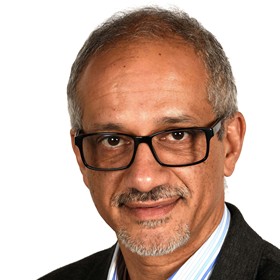COVID-19 AND THE SHORTCOMINGS OF NEOLIBERALISM
Dr. Alfredo Saad-Filho, King's College, United Kingdom
About our Guest: Dr. Alfredo Saad-Filho is a professor of Political Economy and International Development at King's College in London, England. He is a coauthor and coeditor of Neoliberalism: A Critical Reader (2014).
Presenter: Ana Fonseca
Description: Dr. Alfredo Saad-Filho discusses his article, "From COVID-19 to the End of Neoliberalism," published in 2020 in the academic journal, Critical Sociology.
How has the COVID-19 pandemic made evident the shortcomings of neoliberal policies? How has the strategy of "herd immunity" shown the inhumanity of neoliberalism, especially during the beginning of the pandemic? In the context of vaccination, how does the notion of "herd immunity," or rather "group immunity," challenge neoliberalism? Given the inefficiencies of neoliberal policies highlighted by the pandemic, should neoliberalism as a social and economic system come to an end? What makes the left the best positioned to engage in an undertaking towards the end of neoliberalism? Dr. Saad-Filho addresses these and other key questions during this interview.
Keywords/themes: COVID-19, neoliberalism, privatization of healthcare systems and neoliberalism, individualism and neoliberalism, group immunity, health-economy continuum.
Alfredo Saad-Filho
"What I think we can draw as a lesson from this pandemic is that more neoliberalised health systems are less centralized, less resilient, less able to respond to the emergency and less able to save lives which has to be the bottom line for any health system; that's how we evaluate how effective they are. And in that case, more privatized health systems have failed miserably at a tremendous cost for their populations."
There is neither a first nor a last word and there are no limits to the dialogic context. - Mikhail Bakhtin
Sharing academic perspectives on social issues within and beyond the academia
© 2014-2024 Academic Perspectives. All Rights Reserved.
About | Copyright Notice


Comments